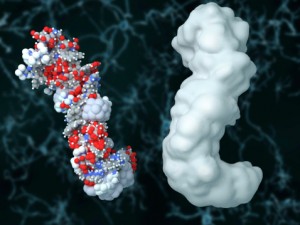Mind-Body Connection: Complexity in Weight Loss
Mind-Body Connection: Complexity in Weight Loss

You can’t eat your way into healthy thinking, but you can probably think your way into healthy eating, which in turn, actually could make your thinking healthier…if only you could figure out where to start.
There was a time when people regarded the physical body as a system quite separate and distinct from the mental realm. The conventional wisdom of cultures throughout the world typically acknowledge and honor a connection between the mind and body, but in the realm of Western science, emotional and cognitive activity has been held as though it exists almost independent of the flesh.
Yet anyone who’s ever gone for the chocolate when they were feeling blue knows, intuitively, that it’s all connected.
And in the last 25 years or so, science has been getting a grip on the physiology underlying the profound connection between our minds and our bodies, and coming up with ways to help us not only understand it, but use it effectively to improve our health and habits, including the habits that have led to the national obesity crisis.
Mind-Body Interplay
Disease and stress research in particular have yielded vast evidence of the inter-related nature of our minds and bodies, showing how people who endure high-pressure lifestyles can experience both acute and chronic health problems because of it.
But our daily lives are full of simpler examples of the mind-body connection, and it’s not always a problem: consider how certain words can make you blush; a sad scene in a movie or song can bring you to tears; a phone call or email from a special someone can make your heart go pitty-pat. Your thoughts are affecting your body chemistry and creating distinct physical responses.
And obviously, it works the other way, too, when what your body experiences produces responses in the brain. A particular smell can stimulate a nostalgic memory. Tickling and rough-housing a grumpy child will often cheer him right up. These are such familiar examples that it’s hard to imagine anyone ever disputed the connection.
But what science has been able to prove in the last couple decades is just why–neurologically—that tickling works to cheer the child. It’s not merely that you’ve distracted him from whatever got his goat. In truth, both laughter and physical exercise cause the release of mood-elevating chemicals in the brain. Laughter really is the best medicine, and you’ve just given him a double dose.
On the other hand, research has proven that a stimulus such as anxiety—a feeling—can trigger the release of nerve-fiber chemicals, which then tell the immune system what to do to help protect the body in a time of emotional stress.
No body (part) is an island
Pioneering scientists say that other systems in the body are also connected in this way, together creating a virtual telephone network of transmitters and receptors, and that’s changing the way we look at how our thinking and habits influence disease, including obesity.
Diseases that used to be studied just within their own body system are looked at more comprehensively now. Diabetes was traditionally considered to be a disease of the endocrine system. But it’s now also understood as an autoimmune disorder—an immune system attacking itself—that typically results from specific lifestyle choices.
Is it any wonder then that the treatment of obesity is so complex? There are powerful forces at play in a problem that used to be reduced to a simple formula: “too much in, not enough out.” With emotional influences on behavioral choices resulting in physical changes that cause physiological adaptations, how could anyone think it’s a simple problem?
That doesn’t mean you have to become a psychoneuroimmunologist in order to drop a few pounds. But if you have struggled futilely with a excess weight and the health problems associated with it, you can take some real encouragement from the advancing scientific understanding of the challenges you live with.
Because if physical activity can change your brain chemistry, affecting how you think and feel, and thoughts can affect your body’s responses, then there’s real hope that you can train your body to train your mind, and vice versa.
The whole nine yards
It’s all one wonderful machine, and comprehensive bariatric weight-loss treatment takes that into account. Even the most nutritionally sound dietary plan cannot be effective in producing lasting weight loss if it’s not coordinated with developing new thinking and habits. Obvious, right?
Yet anyone who’s ever dieted knows that’s easier said than done. But what if you could reprogram your neural pathways so that your body automatically supported your new thinking, and your thinking automatically defaulted to healthier dietary choices?
And what if that could happen without all the constant emotional struggle? What if you could just lose your taste for the sweets you crave today? What if exercise was your automatic answer to sadness, instead of chocolate?
It can be done, but it’s no simple matter of developing a menu. That’s why bariatric specialists have to approach obesity from all fronts.
We work with patients to discover their motivations and values. We can consider the chemical imbalances that may be present and how best to address them, whether with activity or medicine or diet or a combination thereof.
We can explore the importance of defining and refining goals, of learning self-nurturing habits and healthy new routines, of cultivating an attitude that maximizes the mind-body connection to its best effect.
People are so surprised when they learn they can control cravings, eat better and enjoy exercise, but for most of us these things have to be learned.
At some point, we learned that eating chocolate can alleviate the blues. There are solid chemical reasons for how it does that, and it’s a lesson that sticks in our bodies as well as our minds. It’s tough to overcome. But we can teach our bodies new lessons.
As science and medicine get better at deciphering the ways our minds and bodies work together, bariatric treatment develops better and better strategies for teaching those lessons.
And when you see that, you almost can’t help but feel—and think, and do—better.
Through Thick & Thin:
If you maximize the potential of the mind-body connection, you’ve got a powerful tool working in your favor. If you dismiss or ignore it, you’re handicapped before you even start.
-
Natural Weight Loss Is Not A Diet Pill
Its ironic, isnt it, that when you search for natural weight loss onli
-
Understanding Weight Loss: How to Lose 20 Pounds by Walking
Walking is a great way to lose 20 pounds for many reasons, and knowin
-
Fast Weight Loss With Exercise: Is It Possible?
There is no doubt that a lot of people are overweight nowadays. And so
-
Stretching And Muscle Endurance
There are various exercises that are helpful to make our body flexible
-
Best Diet Type Losing Weight For Your Wedding
Choosing the right diet type is the most important decision youll make
-
Dr. Oz Answers Lawmakers on Weight Loss Tips
Lawmakers wa
- DON'T MISS
- Your Monday to Sunday Guide to Getting Fit and Staying Motivated
- Hazardous Waist
- Using Motivation as the Key To Effective Weight Loss
- Low Carb Diets Cause More Than Water Weight Loss
- 9 Sure Fire Tips For Easy Weight Loss
- Don't Diet Ever Again!
- Cellulite What Really Works
- Quick And Healthy Weight Loss - Easy Diets That Work
- Eat Your Way To Great Health
- Lose The Pounds And Not The Fun – Easy Weight Loss Advice




